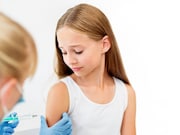More must be done to combat false information about childhood vaccines being spread by ‘anti-vaxxers’
TUESDAY, July 2, 2019 (HealthDay News) — The anti-vaccination movement is now a global crisis, an international panel of scientists say, and everyone must do more to combat it.
“We are alarmed that the World Health Organization this year declared vaccine hesitancy a top-10 international public health problem. This is a man-made, dangerous, and wholly unnecessary crisis,” said Scott Ratzan, M.D., founding editor of the Journal of Health Communication and founder of the International Working Group (IWG) on Vaccination and Public Health Solutions.
The new Salzburg Statement on Vaccine Acceptance, published online July 2 in the Journal of Health Communication, has been endorsed by 60 leaders in public health from the Americas, Europe, Asia, Africa, and Australia. According to the group, vaccines have prevented hundreds of millions of infectious diseases — such as polio, measles, hepatitis B, and meningitis — and save up to three million lives a year. They are cost-effective, too. Every U.S. dollar spent on childhood immunization returns up to $44 in benefits. But in the United States, outbreaks of measles have recently occurred in hotspots where parents have refused to vaccinate their children. In response, some U.S. states have reacted by closing “personal belief” loopholes that allowed parents to not immunize a school-aged child.
And the problem is now a global one, the consortium of scientists added in a journal news release. So, more must be done to combat false information about childhood vaccines being spread by anti-vaxxers. The experts called on governments and policymakers to support laws that limit exemptions from mandatory vaccination and to regard childhood vaccination as an essential service — in line with services such as police, firefighters, and public sanitation. Social media companies and major search engines also need to better monitor the vaccine information they provide in order to prevent the spread of inaccurate and false claims about vaccine safety, just as they do for sexually explicit, violent, and threatening messages, the group said.
Copyright © 2019 HealthDay. All rights reserved.








